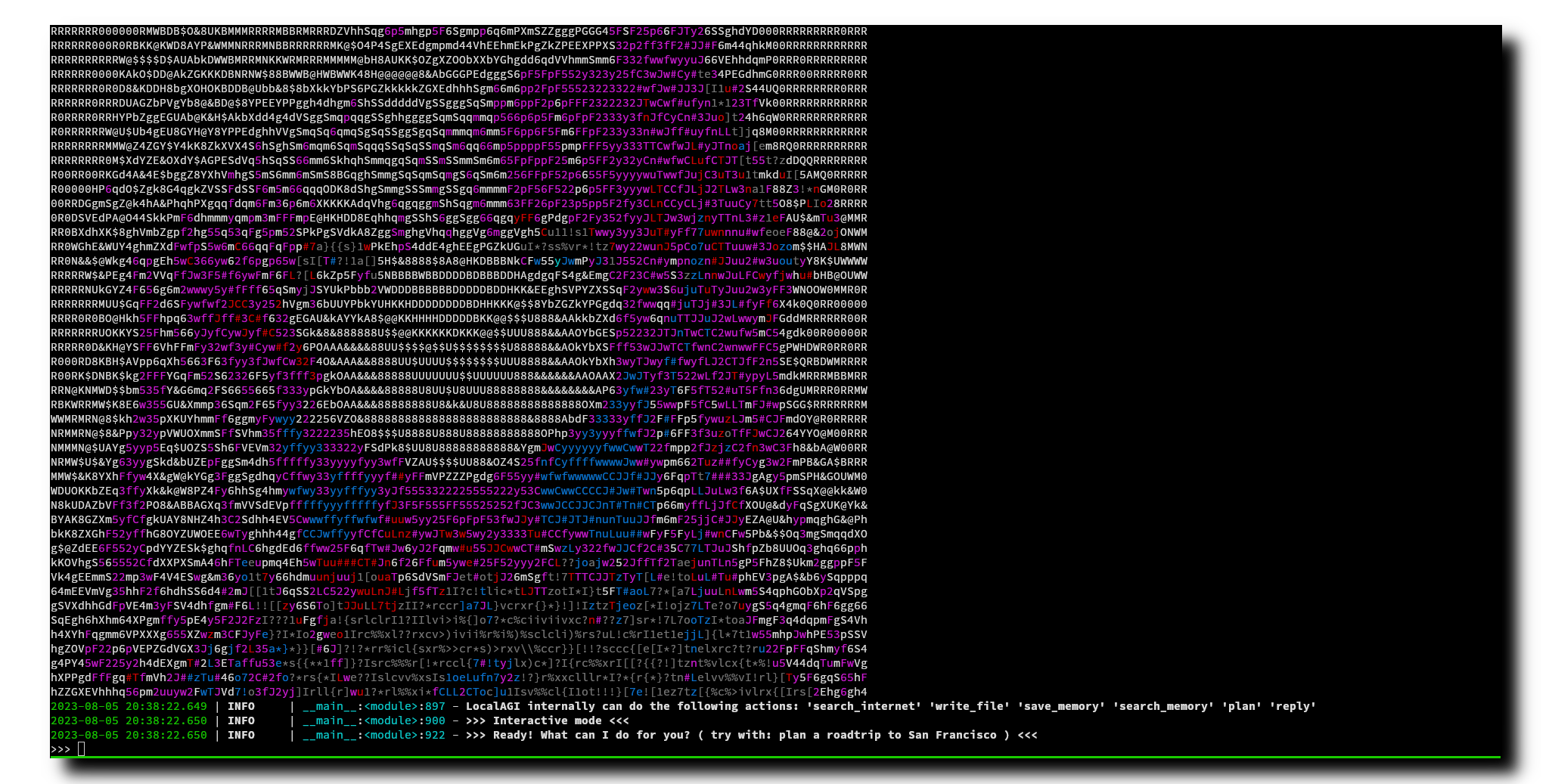mirror of
https://github.com/mudler/LocalAI.git
synced 2025-01-25 21:59:27 +00:00
175 lines
8.4 KiB
Markdown
175 lines
8.4 KiB
Markdown
|
|
+++
|
|
disableToc = false
|
|
title = "LocalAGI"
|
|
weight = 2
|
|
+++
|
|
|
|
LocalAGI is a small 🤖 virtual assistant that you can run locally, made by the [LocalAI](https://github.com/go-skynet/LocalAI) author and powered by it.
|
|
|
|

|
|
|
|
[AutoGPT](https://github.com/Significant-Gravitas/Auto-GPT), [babyAGI](https://github.com/yoheinakajima/babyagi), ... and now LocalAGI!
|
|
|
|
Github Link - https://github.com/mudler/LocalAGI
|
|
|
|
## Info
|
|
|
|
The goal is:
|
|
- Keep it simple, hackable and easy to understand
|
|
- No API keys needed, No cloud services needed, 100% Local. Tailored for Local use, however still compatible with OpenAI.
|
|
- Smart-agent/virtual assistant that can do tasks
|
|
- Small set of dependencies
|
|
- Run with Docker/Podman/Containers
|
|
- Rather than trying to do everything, provide a good starting point for other projects
|
|
|
|
Note: Be warned! It was hacked in a weekend, and it's just an experiment to see what can be done with local LLMs.
|
|
|
|

|
|
|
|
## 🚀 Features
|
|
|
|
- 🧠 LLM for intent detection
|
|
- 🧠 Uses functions for actions
|
|
- 📝 Write to long-term memory
|
|
- 📖 Read from long-term memory
|
|
- 🌐 Internet access for search
|
|
- :card_file_box: Write files
|
|
- 🔌 Plan steps to achieve a goal
|
|
- 🤖 Avatar creation with Stable Diffusion
|
|
- 🗨️ Conversational
|
|
- 🗣️ Voice synthesis with TTS
|
|
|
|
## :book: Quick start
|
|
|
|
No frills, just run docker-compose and start chatting with your virtual assistant:
|
|
|
|
```bash
|
|
# Modify the configuration
|
|
# nano .env
|
|
docker-compose run -i --rm localagi
|
|
```
|
|
|
|
## How to use it
|
|
|
|
By default localagi starts in interactive mode
|
|
|
|
### Examples
|
|
|
|
Road trip planner by limiting searching to internet to 3 results only:
|
|
|
|
```bash
|
|
docker-compose run -i --rm localagi \
|
|
--skip-avatar \
|
|
--subtask-context \
|
|
--postprocess \
|
|
--search-results 3 \
|
|
--prompt "prepare a plan for my roadtrip to san francisco"
|
|
```
|
|
|
|
Limit results of planning to 3 steps:
|
|
|
|
```bash
|
|
docker-compose run -i --rm localagi \
|
|
--skip-avatar \
|
|
--subtask-context \
|
|
--postprocess \
|
|
--search-results 1 \
|
|
--prompt "do a plan for my roadtrip to san francisco" \
|
|
--plan-message "The assistant replies with a plan of 3 steps to answer the request with a list of subtasks with logical steps. The reasoning includes a self-contained, detailed and descriptive instruction to fullfill the task."
|
|
```
|
|
|
|
### Advanced
|
|
|
|
localagi has several options in the CLI to tweak the experience:
|
|
|
|
- `--system-prompt` is the system prompt to use. If not specified, it will use none.
|
|
- `--prompt` is the prompt to use for batch mode. If not specified, it will default to interactive mode.
|
|
- `--interactive` is the interactive mode. When used with `--prompt` will drop you in an interactive session after the first prompt is evaluated.
|
|
- `--skip-avatar` will skip avatar creation. Useful if you want to run it in a headless environment.
|
|
- `--re-evaluate` will re-evaluate if another action is needed or we have completed the user request.
|
|
- `--postprocess` will postprocess the reasoning for analysis.
|
|
- `--subtask-context` will include context in subtasks.
|
|
- `--search-results` is the number of search results to use.
|
|
- `--plan-message` is the message to use during planning. You can override the message for example to force a plan to have a different message.
|
|
- `--tts-api-base` is the TTS API base. Defaults to `http://api:8080`.
|
|
- `--localai-api-base` is the LocalAI API base. Defaults to `http://api:8080`.
|
|
- `--images-api-base` is the Images API base. Defaults to `http://api:8080`.
|
|
- `--embeddings-api-base` is the Embeddings API base. Defaults to `http://api:8080`.
|
|
- `--functions-model` is the functions model to use. Defaults to `functions`.
|
|
- `--embeddings-model` is the embeddings model to use. Defaults to `all-MiniLM-L6-v2`.
|
|
- `--llm-model` is the LLM model to use. Defaults to `gpt-4`.
|
|
- `--tts-model` is the TTS model to use. Defaults to `en-us-kathleen-low.onnx`.
|
|
- `--stablediffusion-model` is the Stable Diffusion model to use. Defaults to `stablediffusion`.
|
|
- `--stablediffusion-prompt` is the Stable Diffusion prompt to use. Defaults to `DEFAULT_PROMPT`.
|
|
- `--force-action` will force a specific action.
|
|
- `--debug` will enable debug mode.
|
|
|
|
### Customize
|
|
|
|
To use a different model, you can see the examples in the `config` folder.
|
|
To select a model, modify the `.env` file and change the `PRELOAD_MODELS_CONFIG` variable to use a different configuration file.
|
|
|
|
### Caveats
|
|
|
|
The "goodness" of a model has a big impact on how LocalAGI works. Currently `13b` models are powerful enough to actually able to perform multi-step tasks or do more actions. However, it is quite slow when running on CPU (no big surprise here).
|
|
|
|
The context size is a limitation - you can find in the `config` examples to run with superhot 8k context size, but the quality is not good enough to perform complex tasks.
|
|
|
|
## What is LocalAGI?
|
|
|
|
It is a dead simple experiment to show how to tie the various LocalAI functionalities to create a virtual assistant that can do tasks. It is simple on purpose, trying to be minimalistic and easy to understand and customize for everyone.
|
|
|
|
It is different from babyAGI or AutoGPT as it uses [LocalAI functions](https://localai.io/features/openai-functions/) - it is a from scratch attempt built on purpose to run locally with [LocalAI](https://localai.io) (no API keys needed!) instead of expensive, cloud services. It sets apart from other projects as it strives to be small, and easy to fork on.
|
|
|
|
### How it works?
|
|
|
|
`LocalAGI` just does the minimal around LocalAI functions to create a virtual assistant that can do generic tasks. It works by an endless loop of `intent detection`, `function invocation`, `self-evaluation` and `reply generation` (if it decides to reply! :)). The agent is capable of planning complex tasks by invoking multiple functions, and remember things from the conversation.
|
|
|
|
In a nutshell, it goes like this:
|
|
|
|
- Decide based on the conversation history if it needs to take an action by using functions. It uses the LLM to detect the intent from the conversation.
|
|
- if it need to take an action (e.g. "remember something from the conversation" ) or generate complex tasks ( executing a chain of functions to achieve a goal ) it invokes the functions
|
|
- it re-evaluates if it needs to do any other action
|
|
- return the result back to the LLM to generate a reply for the user
|
|
|
|
Under the hood LocalAI converts functions to llama.cpp BNF grammars. While OpenAI fine-tuned a model to reply to functions, LocalAI constrains the LLM to follow grammars. This is a much more efficient way to do it, and it is also more flexible as you can define your own functions and grammars. For learning more about this, check out the [LocalAI documentation](https://localai.io/docs/llm) and my tweet that explains how it works under the hoods: https://twitter.com/mudler_it/status/1675524071457533953.
|
|
|
|
### Agent functions
|
|
|
|
The intention of this project is to keep the agent minimal, so can be built on top of it or forked. The agent is capable of doing the following functions:
|
|
- remember something from the conversation
|
|
- recall something from the conversation
|
|
- search something from the internet
|
|
- plan a complex task by invoking multiple functions
|
|
- write files to disk
|
|
|
|
## Roadmap
|
|
|
|
- [x] 100% Local, with Local AI. NO API KEYS NEEDED!
|
|
- [x] Create a simple virtual assistant
|
|
- [x] Make the virtual assistant do functions like store long-term memory and autonomously search between them when needed
|
|
- [x] Create the assistant avatar with Stable Diffusion
|
|
- [x] Give it a voice
|
|
- [ ] Use weaviate instead of Chroma
|
|
- [ ] Get voice input (push to talk or wakeword)
|
|
- [ ] Make a REST API (OpenAI compliant?) so can be plugged by e.g. a third party service
|
|
- [x] Take a system prompt so can act with a "character" (e.g. "answer in rick and morty style")
|
|
|
|
## Development
|
|
|
|
Run docker-compose with main.py checked-out:
|
|
|
|
```bash
|
|
docker-compose run -v main.py:/app/main.py -i --rm localagi
|
|
```
|
|
|
|
## Notes
|
|
|
|
- a 13b model is enough for doing contextualized research and search/retrieve memory
|
|
- a 30b model is enough to generate a roadmap trip plan ( so cool! )
|
|
- With superhot models looses its magic, but maybe suitable for search
|
|
- Context size is your enemy. `--postprocess` some times helps, but not always
|
|
- It can be silly!
|
|
- It is slow on CPU, don't expect `7b` models to perform good, and `13b` models perform better but on CPU are quite slow.
|